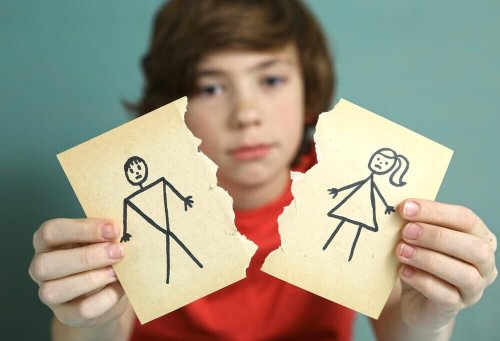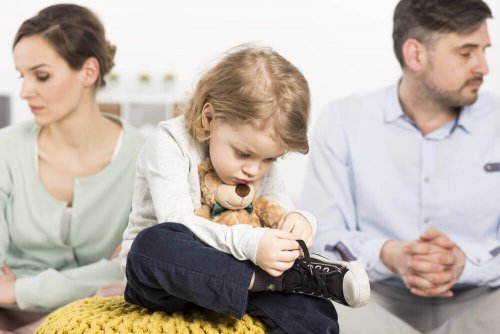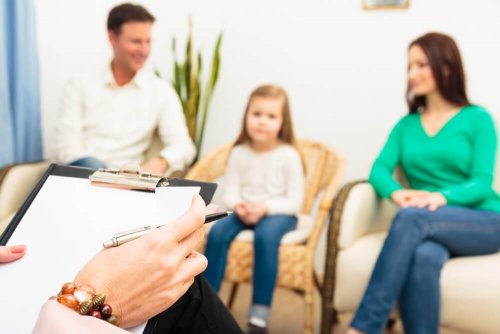7 Harmful Effects of Divorce in the Lives of Children


Written and verified by the psychologist Bernardo Peña
In general, the harmful effects of divorce are often irreversible, particularly devastating in children, and manifest as poor self-esteem.
Similarly, it affects other aspects of their lives such as academics and, in some cases, health. Divorce is much more than the dissolution of the marriage. When parents separate, the children’s world often comes crashing down.
Separation creates a state of grief that each family member must cope with. Although experts say that the children manage to adapt and assimilate, the truth is that no one comes out of the divorce unscathed.
The causes of divorce

Some of the most common causes of divorce include:
- Infidelity
- Addiction
- Domestic violence (physical or emotional)
- Unresolvable differences between the couple
- Accumulated disappointments or personal dissatisfaction
- Routine and boredom
How a divorce can play out
There are two types of procedures typically used for divorce:
1. By mutual agreement
This is best for couples who have children because it has less of an impact on them.
In this type of separation, a couple works through their friction in harmony. Constant arguments that could harm the children are avoided, thus lessening the harmful effects of divorce.
Like this article? You may also like to read: 7 Tips for Talking to Your Children About Divorce
2. Contentious divorce
In this case, one spouse will file a complaint and justify their reasons for requesting the divorce. The other spouse generally will disagree with the decision and oppose it outright, generating conflict.
As you can imagine, there are more likely negative effects of divorce when this occurs.
The harmful effects of divorce on children
The ability of a child to overcome the damage caused by divorce will differ from case by case. It will largely depend on how both parents handle the separation.
Nevertheless, here are some common harmful effects of divorce on children:
1. Low self-esteem is one of the effects of divorce on children

Depending on their age and ability to face new situations, divorce can leave a large or small mark on a child’s self-esteem. During a divorce your child might feel like they’re not important or that their parents aren’t considering them in the process, as per this study published in Apuntes de psicología.
This is typically because parents invest a lot of time in the divorce and that takes away from the attention they pay to their children. If they lose that interaction with the spouse who no longer lives at home, the child may feel abandoned.
2. Feelings of guilt
It usually takes several years to overcome the loss of having both parents under the same roof. If communication between the parents is poor, the child may believe that they’re responsible for the split. This is clear in this article published in the journal Universitas Psychologica.
This can happen if both parents aren’t sufficiently mature to face the conflict and accept their responsibility, thus reinforcing a feeling of abandonment.
Involving your children in your divorce will only make them more vulnerable. They should never be put in the position of having to choose between one parent or the other. This will only cause greater emotional damage. They’ll feel guilty regardless of who they choose.
3. Depression is one of the effects of divorce in children
Losing a familiar lifestyle and the happiness they once had at home will generally create uncertainty. If they have to move out of the house, change schools, and leave their friends, depression will follow. They also lose the security and confidence that they got from their parents’ love through family activities.
It may also be the case that they’re forced to live with just one of their parents. If the time they get to spend with the other parent is too little, their attitude can go from depressed to hostile.
Children are likely to find separation hard to accept and invent fantasies of reconciliation. When this ultimately doesn’t happen, it can increase their frustration and depression.
4. Difficulties in social situations
Another harmful effect of divorce on the lives of children is social difficulties. During the separation, the child might only think about what’s going on at home. That can decrease their motivation to play and interact with their friends.
Academic performance may also decline. This is because the child might be so concerned with the family situation, they neglect other areas of their lives. Children need to have some distance between their parents’ divorce and their own lives.
We think you may also like to read this article: What Are Parenting Classes and What Do You Learn There?
5. Fear of the future

Moving from a state of family happiness to one of separation can destabilize anyone. Anything that a child could imagine won’t prepare them for losing a parent. Divorce generates a tremendous amount of uncertainty about the future.
This experience can affect them in relationships they have down the line. Most likely, they’ll be afraid to settle down or get married themselves, recalling the experience of their parent’s divorce.
6. Behavioral problems are effects of divorce
The divorce will generate irritability, difficulties sleeping, alterations in the alimentary regime, and in general, restlessness. The separation supposes negative effects of paternal absence, and economic stress. Furthermore, boys have a harder time overcoming this kind of crisis. Thus, they express it by getting into trouble at school.
Another trauma caused by divorce is the fracture of social support networks, as children are generally forced to move to another neighborhood or school, losing friends and context.
In addition, children may assume responsibilities that aren’t appropriate to their age or maturity level, such as caring for younger siblings, the obligation to perform certain household chores, or serving as an emotional counterbalance for one of the parents.
7. Psychosomatic diseases
Psychosomatic diseases are among the many damages caused by divorce. These are due to the high levels of stress during the process and anxiety about their new and unfamiliar way of life.
The harmful effects of divorce on children
First of all, note that divorces should always be conducted as civilly as possible. You must proceed tactfully and as friendly as possible, especially when there are children involved.
Be aware that not all children manifest problems due to their parents’ new marital status. In this respect, the most serious problems are due to a lack of information and not knowing what’s going to happen.
The discomforts presented by children whose parents are going through a divorce process aren’t imaginary. They physically feel bad about it. In view of this, you must seek professional help to treat the emotional damage that your divorce may have caused your children and help them cope with the coming changes.
All cited sources were thoroughly reviewed by our team to ensure their quality, reliability, currency, and validity. The bibliography of this article was considered reliable and of academic or scientific accuracy.
- Camacho, B. M., & Rodríguez, M. D. M. G. (2012). Divorcio y ajuste psicológico infantil. Primeras respuestas a algunas preguntas repetidas. Apuntes de psicología, 30(1-3), 351-360. http://www.apuntesdepsicologia.es/index.php/revista/article/view/417
- Muñoz-Ortega, M. L., Gómez-Alaya, P. A., & Santamaría-Ogliastri, C. M. (2008). Pensamientos y sentimientos reportados por los niños ante la separación de sus padres. Universitas Psychologica, 7(2), 356-356. https://revistas.javeriana.edu.co/index.php/revPsycho/article/view/314
- Nuñez Mederos, C. S., Pérez Cernuda, C., & Castro Peraza, M. (2017). Consecuencias del divorcio-separación en niños de edad escolar y actitudes asumidas por los padres. Revista Cubana de Medicina General Integral, 33(3), 296-309. http://scielo.sld.cu/scielo.php?pid=S0864-21252017000300003&script=sci_arttext&tlng=pt
- Sebastián Peral, S. (2014). Programa de Aprendizaje-Servicio: elaboración de materiales educativos con hijos e hijas en proceso de divorcio o separación. https://uvadoc.uva.es/bitstream/handle/10324/6827/TFG-L681.pdf?sequence=1&isAllowed=y
- Vallejo Orellana, R., Sánchez-Barranco Vallejo, F., & Sánchez-Barranco Vallejo, P. (2004). Separación o divorcio: trastornos psicológicos en los padres y los hijos. Revista de la asociación española de neuropsiquiatría, (92), 91-110. https://scielo.isciii.es/scielo.php?script=sci_arttext&pid=S0211-57352004000400006
This text is provided for informational purposes only and does not replace consultation with a professional. If in doubt, consult your specialist.








